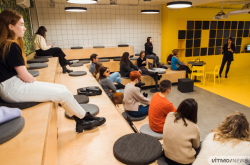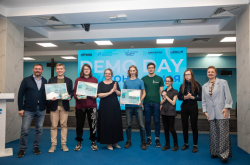Supported by the federal project Platform for Student Technological Entrepreneurship, the hackathon became the opening event of the ITMO Food acceleration platform. Participants could join in the hybrid format by solving cases and communicating with VkusVill experts online or from an ITMO coworking space. On the first day, hackathon participants could choose one of the four cases on automation of business processes. Then, teams of participants toured dark stores – storage facilities for online orders; during the tour, they learned how VkusVill processes and delivers orders. The hackathon culminated with a final pitch, where 17 teams defended their solutions before experts.
“We believe that within the student community at large – and the one at ITMO in particular – there are many people with a vision similar to ours; they inspire us and may become our future employees. At VkusVill, we have assembled a team of some of the best professionals in the country and yet we are keen to find fresh new perspectives on our daily tasks. Here, we greatly benefit from the ideas of young talents. Many of their suggestions deserve attention; our experts will evaluate them once more and try to implement them into our workflow. We will continue collaborating with some of the students,” shared Sergey Kunitsyn, the head for innovations at VkusVill.

Sergey Kunitsyn. Photo by Kirill Dzhenzerukha / Megabyte Media
Among hackathon participants were school and university students with backgrounds in 1C development, business analytics, product management, or UX/UI design.
Winning projects
For the case Stock-Taking 2.0, the teams had to look for a way to automate the verification of actual dark store shelf stock. Currently, employees have to manually count the products 10-20 times a day, which takes over 9 hours. The winning team came up with a ranking system for each product that is based on such parameters as expiry date, items in stock, and time since last stock-taking. In their solution, the significance of the parameters is calculated with machine learning – it was the students’ first time working with algorithms.
“We learned about the hackathon through ITMO Technopark. We regularly participate in hackathons and win them, but it was the first competition with such an interesting format. Usually, to solve a business task, we need to search online, but here we were taken on a tour of a dark store and got to learn about its mechanics. Dark store employees and VkusVill experts wanted to ensure that our solutions would closely reflect the real conditions, so they answered all our questions,” said Anastasia Bogdanova, a member of the winning team and a second-year student of the Faculty of Technological Management and Innovations.
Dark store employees find it equally important to know exactly where products with an approaching expiration date are located. Currently, storage periods are checked either manually or using expiration date logs. For the Expiration Control case, the winning team Essentially Delicious decided to speed up this process through separate storage of products. Different items can be placed on the same shelf, but they must all have the same arrival date. All information is stored in a database, and artificial intelligence algorithms assist employees in determining which shelf to store products on and where to retrieve them.
When the number of orders is high, one employee can end up assembling up to three of them at once. However, errors also become more common: orders can get mixed up or different types of products can be packaged incorrectly. In order to facilitate this process and decrease the error rate in the case Parallel Assembly, the team Four In a Boat (To Say Nothing of VkusVill) suggested packing orders into bags with differently colored tags and weighing them to check that their projected weight matches the actual one.
When a large order arrives at a dark store, it is divided between employees. They collect half of the items each, package them into bags, and seal each one with a label. At the end of the assembly process, the entire order is put together with another sticker indicating how many bags the courier and, consequently, the customer should receive. However, during assembly, it is hard to predict how many labels and bags will ultimately be needed. To address this issue in the How Not to Lose a Bag case, the winning team Cute Taste presented a machine learning model that calculates in advance the number of bags required and the preparation time for each employee.
Participants of all four winning teams received 5,000 VkusVill loyalty points, professional microphones, speakers, and headphones, as well as the opportunity to implement their ideas at the company. They will all be able to improve their ideas at the ITMO Food Accelerator (page in Russian).













